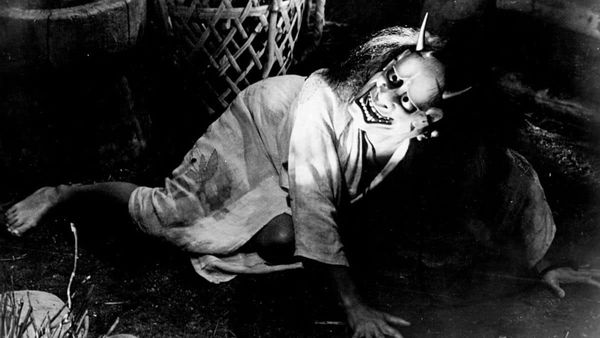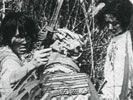Eye For Film >> Movies >> Onibaba (1964) Film Review

During a period of unending civil strife in Japan, young men were conscripted, leaving their families destitute and unable to farm the land. In this war-ravaged existence of famine and poverty, the mother (Nobuko Otowa) of a conscript and his wife (Jitsuko Yoshimura) lure straggling samurai to their deaths in the labyrinth of grasses that surround their home, steal their belongings and pitch their bodies into a hole.
Hachi (Kei Sato), another conscript, returns unexpectedly. Despite the mother's protests that he may have been responsible for the death of her son, the younger woman finds herself irresistibly attracted to him. Terrified of abandonment and death, the mother puts a plan into motion that may destroy all three of them.

Onibaba is a forbidding, claustrophobic film, a bleak depiction of human nature, set in a land desolated and dehumanised by war, in a sea of grasses that whisper, rush and close in on the three characters. Indeed, the landscape is the main character, beautifully shot in stark black-and-white.
Kaneto Shindo's film positively pants with sexual desire. But this is not a film about love; it's a film about subsistence. Death surrounds these people and they survive the only way they know how - by killing. When night comes, the young woman and Hachi lose themselves in love making as a base impulse, not an expression of emotion. Even the older woman's warnings of hell and damnation can't stay their desire and Shindo hints that her admonitions are less to do with morality than with jealousy, tormented, as she is, by her own sexual needs.
In this sense, it is a deeply misanthropic film, showing human beings stripped of nobility, reduced to base creatures, clinging to life in a hostile world. Are those who lose their humanity even alive? In the shattering final scenes, the old woman is reduced to screaming, "I am a human, not a demon!" It's a devastatingly hollow cry.
Commonly miscategorised as a horror film, Onibaba is certainly horrific, but only due to the starkness of the message, brilliantly conveyed with fever dream intensity. The air of menace is evoked right from the start by Hikaru Hayashi's jarring score and maintained by unsettling sound effects - pigeons, rain, wind rushing through those ominous grasses.
At its core, this is a morality tale, based on the tradition of Buddhist parables, although the film breaks free of simple moralising. It is a piece of pure cinema, conveying narrative via music and symbolism, devoid of dialogue for much of the time.
Unique in its imagery, shocking in its sexual frankness and shattering in its climax, Onibaba is a masterful piece of Japanese cinema, ripe for rediscovery.
Reviewed on: 02 Feb 2005



















